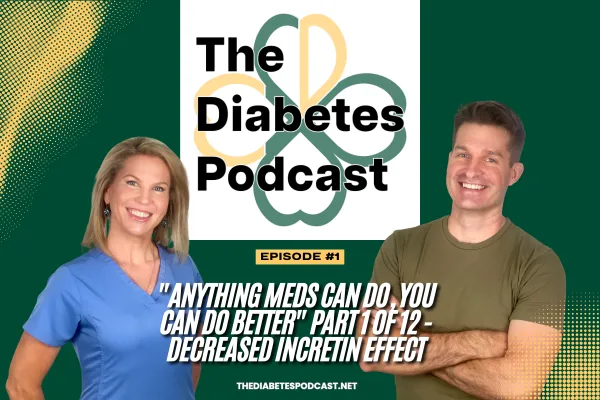
EP001 - Diabetes Dirty Dozen - Part 1
Decreased Incretin Effect: A Simple Guide to GLP-1, GIP, Side Effects, Costs, and Natural Ways to Help
“These drugs aren’t a fix by themselves—they’re a bridge while you build habits that last.” - Amber
Welcome to the very first episode of The Diabetes Podcast. I’m Richie Wilhoit (TRS-C), and I’m joined by my co-host (and the world's greatest spouse), Amber Wilhoit (RD/LD, CDCES). Today we kick off our 12-part series, “Anything Meds Can Do, You Can Do Better,” by talking about Decreased Incretin Effect. If that phrase is new to you, don’t worry. We’re going to explain it in clear, simple terms. We’ll share how GLP-1 and GIP medicines work, why they’re so popular, the side effects and costs, and the food and lifestyle steps that can boost your body’s own incretin effect.
What You’ll Learn
What the incretin effect is
What Decreased Incretin Effect means in type 2 diabetes
How GLP-1 and GIP medicines work (Ozempic, Mounjaro, Wegovy)
Why these meds are so popular right now
Side effects and safety tips, including anesthesia risks
Real-world costs and insurance facts
Food and lifestyle actions to boost incretin effect naturally
How to use meds as a bridge while you build strong habits
What Is the Incretin Effect?
When you eat, especially carbs, your blood sugar rises.
Your gut releases two key hormones: GLP-1 and GIP.
These hormones tell your pancreas, “Food is coming—get ready to make insulin.”
Your pancreas then makes insulin faster and more efficiently to keep blood sugar from going too high.
Fun fact: The body makes more insulin when sugar is eaten by mouth than when it’s given through an IV. This is because the gut hormones switch on during eating. That boost is the incretin effect.
What Is Decreased Incretin Effect?
In type 2 diabetes, the incretin effect is weaker or missing.
The body may make less GLP-1 and GIP, or the body does not respond to them well.
Result: slower insulin release after meals and bigger blood sugar spikes.
Those after-meal spikes are linked to many long-term risks in type 2 diabetes.
GLP-1 and GIP Medicines 101
Common brands:
Ozempic and Wegovy (semaglutide) are GLP-1 receptor agonists.
Mounjaro (tirzepatide) is a dual GLP-1/GIP agonist.
What they do:
Brain: Reduce hunger and improve fullness by acting on appetite signals (ghrelin and leptin).
Stomach: Delay gastric emptying (food leaves your stomach more slowly), which can lower after-meal blood sugar spikes.
Pancreas: Help release more insulin, but only when glucose is present (glucose-dependent). This lowers the risk of low blood sugar in people not using insulin.
Why Are These Meds So Popular?
In people without diabetes, the appeal is often weight loss and appetite control.
In people with type 2 diabetes, the benefits include better blood sugar control plus appetite reduction and weight loss support.
Media and social platforms highlight quick weight loss, which boosts demand.
There were supply shortages. This led to a 503A exemption where compounding pharmacies could make versions during the shortage.
Important note: Compounded versions may vary in purity and potency. They are not the FDA-approved products. Some are salts or analogs. This is a buyer-beware area.
How Do These Meds Help With Blood Sugar?
By slowing the speed that food leaves the stomach, the rise in blood sugar after a meal can be smaller.
By boosting insulin release when glucose is present, the body can manage the meal more effectively.
Together, this can mean lower after-meal spikes and better overall control.
Common Side Effects You Should Know
Nausea and vomiting (most common), sometimes diarrhea
Dehydration, which can stress the kidneys; rare acute kidney injury has been reported due to dehydration
Important anesthesia risk: Because these meds slow stomach and intestinal movement, food and stool can back up. There has been a reported case of aspiration pneumonia under anesthesia. Always tell your surgical team if you use a GLP-1 or GIP medicine.
Why nausea happens: When gastric emptying is delayed, food sits longer in the stomach. This can make you feel sick and may lead to vomiting.
Will I Need These Meds Forever?
Some people see rebound weight gain after stopping.
Hunger may return stronger if habits are not in place.
Muscle loss can happen if you eat too little protein and too few calories while on the medicine. Less muscle can slow your metabolism and make weight regain more likely.
Your body may downregulate its own GLP-1 production while on the medicine. After stopping, it may take time and strong habits to rebuild your natural signals.
Bottom line: Use meds if needed, but also build your nutrition, movement, sleep, and stress skills. The goal is to let your body do more of the work over time.
Potential Benefits Beyond Sugar and Weight
Some GLP-1 receptor agonists have shown cardiovascular benefits.
There may be kidney protective effects in people with type 2 diabetes.
There may be some preservation of beta cell function (the insulin-making cells).
These benefits can also be supported by diet, exercise, weight management, quality sleep, and stress care.
Real-World Costs and Coverage
If you have type 2 diabetes and insurance, many pay about $25–$200 per month.
Without coverage, list prices can be about $950–$1,350 per month.
Compounded versions during shortages may be offered at lower monthly prices, or with annual plans that average about $4,500 per year. These are not FDA-approved versions and may vary in purity and potency.
If you have prediabetes or are seeking weight loss coverage, insurance may not pay. Prior authorization is common.
Talk with your provider and your insurer to understand your options and costs.
Natural Ways to Boost Your Incretin Effect
Anything meds can do, your body can do better—when you build the right habits. These steps may support GLP-1 and GIP, reduce after-meal spikes, and improve insulin sensitivity.
Food Steps
Fermented foods: kimchi, kombucha, sauerkraut
High fiber foods: beans, lentils, whole grains, veggies, and fruit with the skin
Resistant starches: cooled potatoes, cooled rice, oats, green bananas
Protein at each meal: eggs, fish, poultry, tofu, Greek yogurt, beans
Healthy fats: olive oil, nuts, seeds, avocado, omega-3s (salmon, chia, flax)
Colorful plants: berries, leafy greens, peppers, tomatoes
Meal Tips
Build meals with protein + fiber + healthy fat.
Eat slowly and stop when you feel satisfied.
Take a short walk after meals to help blunt glucose spikes.
Lifestyle Habits
Move your body every day. Add strength training 2–3 times per week to protect muscle.
Aim for 7–9 hours of sleep. Poor sleep can raise hunger and insulin resistance.
Manage stress with breathing, prayer, mindfulness, or time outdoors.
Keep a routine you can live with. Small steps, repeated daily, add up.
When Are These Meds Most Helpful?
When there is a clear need: type 2 diabetes with high after-meal spikes, strong hunger, or weight gain.
When you use them as a bridge: get control early while you build your plan for food, movement, sleep, and stress.
When you have a strategy to protect muscle: adequate protein and strength training help you hold onto muscle while appetite is lower.
When you have a plan to step down later: work with your care team on a taper and habit support so you can keep your progress.
A Word on Safety and Procedures
Tell your healthcare team if you are on a GLP-1 or GIP medicine before any procedure or anesthesia.
Because these meds slow gastric emptying and gut movement, your team may adjust timing or give special instructions to reduce risk.
Who Is This For?
This episode and guide focus on type 2 diabetes and Decreased Incretin Effect.
Type 1 diabetes is different. Type 1 is insulin deficiency from an autoimmune process.
In rare cases, a person with type 1 can also develop type 2 features. Work closely with your care team if this applies to you.
Questions To Ask Your Healthcare Provider
Do I show signs of Decreased Incretin Effect?
Would a GLP-1 or GIP medicine help me right now?
What dose should I start with? How can I manage nausea?
How can I protect muscle while my appetite is lower?
Should I stop this medicine before surgery or procedures?
What is our plan to step down later?
Which food and lifestyle steps should I start this week?
Key Takeaways
Decreased Incretin Effect is a core problem in type 2 diabetes.
GLP-1 and GIP meds can improve after-meal blood sugar, reduce hunger, and support weight loss. Some heart and kidney benefits are seen in people with type 2 diabetes.
Side effects include nausea, vomiting, diarrhea, dehydration, and anesthesia risks. Always tell your care team.
Costs vary a lot. Coverage depends on diagnosis and your plan. Compounded versions are not the same as FDA-approved products.
Habits are the foundation. Use meds wisely as a bridge while you build nutrition, movement, sleep, and stress skills. The goal is to let your body do more over time.
About The Diabetes Podcast
Hosts: Amber Wilhoit (RD/LD, CDCES) and Richie Wilhoit (TRS-C)
Series: “Anything Meds Can Do, You Can Do Better,” covering the 12 core defects in type 2 diabetes
Next episode: Renal glucose reabsorption and SGLT-2 medicines (Farxiga, Jardiance, Invokana), plus natural strategies you can use on your own
Join the Conversation
Have questions about Decreased Incretin Effect or GLP-1/GIP meds? Send them to [email protected] and we’ll do our best to answer.
Please like and subscribe. This really helps us in our goal to reach as many people as we can at no cost to you.
Disclaimer
The information in this blog post and podcast is for educational and informational purposes only. It is not medical advice, diagnosis, or treatment, and it does not replace a one-on-one relationship with your physician or qualified healthcare professional. Always talk with your doctor, pharmacist, or care team before starting, stopping, or changing any medication, supplement, exercise plan, or nutrition plan—especially if you have diabetes, prediabetes, heart, liver, or kidney conditions, or take prescription drugs like metformin or insulin.
Results vary from person to person. Examples, statistics, or studies are shared to educate, not to promise outcomes. Any discussion of medications, dosing, or side effects is general in nature and may not be appropriate for your specific situation. Do not ignore professional medical advice or delay seeking it because of something you read or heard here. If you think you are experiencing an emergency or severe side effects (such as persistent vomiting, severe diarrhea, signs of dehydration, allergic reaction, or symptoms of lactic acidosis), call your local emergency number or seek urgent care right away.
We strive for accuracy, but health information changes over time. We make no guarantees regarding completeness, timeliness, or suitability of the content and assume no liability for actions taken or not taken based on this material. Use of this content is at your own risk.
Links or references to third-party resources are provided for convenience and do not constitute endorsement. By reading, listening, or using this information, you agree to these terms and understand that you are responsible for your own health decisions in partnership with your licensed healthcare provider.

